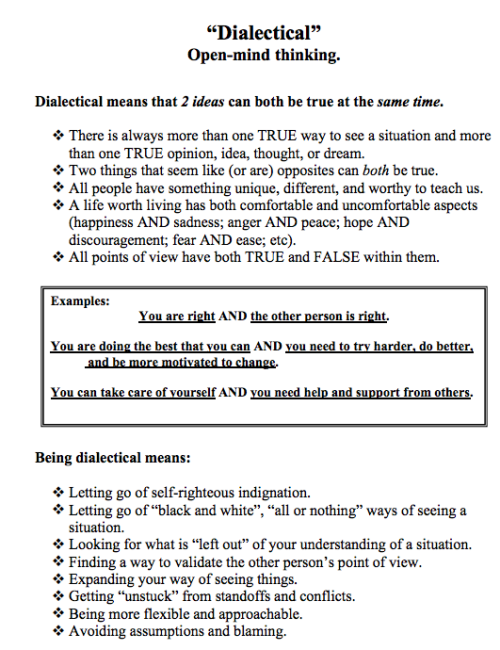tikkunolamorgtfo:elodieunderglass: jonnoxvxrevanche:oaluz:this is just so helpful and freeing to
tikkunolamorgtfo:elodieunderglass: jonnoxvxrevanche: oaluz: this is just so helpful and freeing to think about doing the best you can AND trying to do better taking care of yourself AND needing care from others too this was such a revelation for me to discover and put into practice and - even beyond just helping myself - allowed me to be kinder and more generous with other people generally The beginning of the cure for the Problems that Plague us When I say “Dialectical thinking will save your sanity and your soul,” I am not even a little bit joking. This is also something I think a lot about when people claim that logic dictates two seemingly opposing ideas cannot BOTH be valid or true. (Setting aside that most people who want to argue logic have never actually studied any logic theory, and they mean something else entirely.)And that’s just not the only kind of logic that exists! Dialectical thought/logic is, in fact, very old! Although admittedly the ancient Greeks often used dialectic logic to uncover a contradiction (famously seen in the Socratic method) and to refute something. Your good ol’ thesis, antithesis, synthesis. A lot of classic western thinking and western logic - the stuff you get from Greece and Athens - is what gives us the black-and-white, one-or-the-other conclusions and arguments. It takes dialectic and still concludes one thing over the other was disproven. But we also have examples of ancient/late antique world dialectic thought that says multiple things can be true (or logically valid) at once. That people can have different experiences or understandings of something, and both can be legitimate. …it’s the Jewish Talmud. Image: The Rabbi’s Cat graphic novel panel. The titular cat drinks from a red ceramic bowl of water placed upon the Rabbi’s desk. Speech bubble says “slurp slurp,” for the cat. The rabbi sits behind the cat, explaining: “Western thought works by thesis, antithesis, synthesis. While Judaism goes thesis, antithesis, antithesis, antithesis…” seriously! Talmudic thought and logic is often largely dialectical. I think unfortunately (and in part due to antisemitism) people see “Talmudic logic,” as legalistic, full of “loopholes,” or cold and needlessly complex. Even if you don’t use the word Talmudic, there’s a lot of dialectic thought that people reject for similar reasons as those. Similarly, I notice an unfortunate amount of people who decry when things “aren’t logical!” Because they conflict, or who insist they only believe in objective facts and truths, and the scientific method™. And people who, in arguments, say things like “facts don’t care about your feelings!” And “you’re being overly emotional here.” But like this post illustrates, any kind of dialectical thought can be other adjectives too — compromising, nuanced, representing a diversity of experience and opinion. It can be organic, community centered thinking. It does the hard work of building together, rather than combatting apart. On the Logician website, Avi Sion writes:On the positive side, we may mention especially two processes, which were more developed in Rabbinic logic than elsewhere, namely a-fortiori argument and reconciliation of conflicting theses. With regard to these (the first and thirteenth Midot of R. Ishmael), there is no doubt that the Rabbis were in advance of their time for centuries, both in the quantity of their practise and in the quality of their theoretical awareness. However, though these processes are demonstrably valid, it does not follow that their use by Rabbis was invariably faultless, nor that their understanding of them was complete.It must be stressed that Aristotelean logic did not take into account degrees of possession of qualities (as does a-fortiori argument), nor the ‘balancing of opposites‘ aspect of logic (as does harmonization of conflicting theses). The species of a genus might have a hierarchical relation to it, but this was not brought out in the syllogism (which merely confirmed the common ground between the terms); and when two arguments arrived at opposite conclusions, there was no conscious attempt to reconcile them (the reasoning process stopped or became unconscious as of the discovery of conflict, with the thought that ‘one thesis or the other or both must be wrong’).Greeks evidently functioned in a more ‘either-or’ (or ‘all or nothing’) mode than the Jews, who rather sought to find the nuances between predicates and the commonalties of disparate views. In Rabbinical debates, this attitude served to maintain the credibility and authority of all participants.Now this is by no means perfect in all cases, all the time. And the use of such logical forms doesn’t make everyone using them more correct. but consider that last sentence again: “this attitude served to maintain the credibility and authority of all participants.” Think about all the ways that can be used in life, especially if you swap out “authority,” with “human dignity,” (the rabbis were very concerned with human dignity and avoiding humiliation of other people.) Other cultures might also refer to similar concepts like: “disagreeing without losing face.” And not every seemingly conflicting idea, reality, or experience even has to be an argument or a battlegrounds to prove one thing and disprove another! Just the simple fact of something like: “I don’t experience that thing that you do/the way that you do. My experience is totally different. Both of our experiences are true and real.” Does wonders. there’s also not always an internal argument or disagreement when I state two experiences that some people may believe conflict are actually both true or valid. One truth doesn’t have to falsify another in order to be a real “truth.” Letting that be okay helps you see more diversity and nuance in the world. SOMETIMES dialectical thought starts with two different views and then reconciles them to show they are not actually in contrast, or disproves one or the other. But also SOMETIMES dialectical thought acknowledges both starting points remain legitimate or valid, or it gives you a new, third view to consider. -- source link
Tumblr Blog : oaluz.tumblr.com

